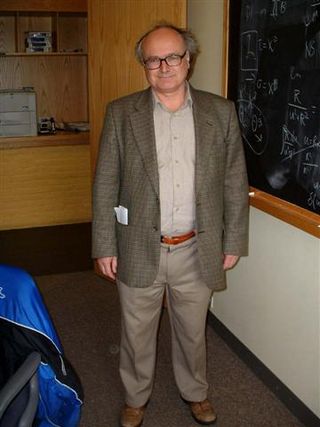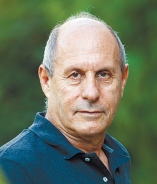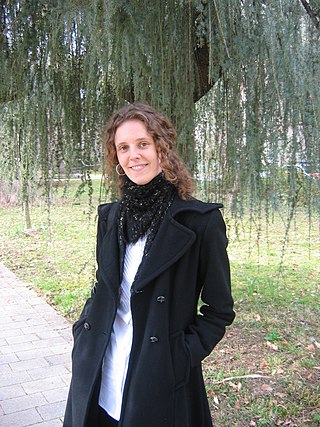Related Research Articles

The Max Planck Institute for Gravitational Physics is a Max Planck Institute whose research is aimed at investigating Einstein's theory of relativity and beyond: Mathematics, quantum gravity, astrophysical relativity, and gravitational-wave astronomy. The institute was founded in 1995 and is located in the Potsdam Science Park in Golm, Potsdam and in Hannover where it closely collaborates with the Leibniz University Hannover. Both the Potsdam and the Hannover parts of the institute are organized in three research departments and host a number of independent research groups.

Dennis William Siahou Sciama, was an English physicist who, through his own work and that of his students, played a major role in developing British physics after the Second World War. He was the PhD supervisor to many famous physicists and astrophysicists, including John D. Barrow, David Deutsch, George F. R. Ellis, Stephen Hawking, Adrian Melott and Martin Rees, among others; he is considered one of the fathers of modern cosmology.

Gary William Gibbons is a British theoretical physicist.
David Wands is professor of cosmology at the Institute of Cosmology and Gravitation, in the University of Portsmouth.
Bernard F. Schutz FInstP FLSW is an American and naturalised British physicist. He is well known for his research in Einstein's theory of general relativity, especially for his contributions to the detection of gravitational waves, and for his textbooks. Schutz is a Fellow of the Royal Society and a Member of the US National Academy of Sciences. He is a professor of physics and astronomy at Cardiff University, and was a founding director of the Max Planck Institute for Gravitational Physics in Potsdam, Germany, where he led the Astrophysical Relativity division from 1995 to 2014. Schutz was a founder and principal investigator of the GEO gravitational wave collaboration, which became part of the LIGO Scientific Collaboration (LSC). Schutz was also one of the initiators of the proposal for the space-borne gravitational wave detector LISA, and he coordinated the European planning for its data analysis until the mission was adopted by ESA in 2016. Schutz conceived and in 1998 began publishing from the AEI the online open access (OA) review journal Living Reviews in Relativity, which for many years has been the highest-impact OA journal in the world, as measured by Clarivate.
The Virgo Consortium was founded in 1994 for Cosmological Supercomputer Simulations in response to the UK's High Performance Computing Initiative. Virgo developed rapidly into an international collaboration between a dozen scientists in the UK, Germany, Netherlands, Canada, United States and Japan.
The South-East Physics Network, or SEPnet, is an association of physics departments at universities in the South-East of England.

Vinod Johri was an Indian astrophysicist. He was an eminent cosmologist, a retired professor of astrophysics at Indian Institute of Technology, Madras and an emeritus professor at Lucknow University since 1995. Johri had over 75 research publications and articles published in pioneering journals. His major contributions in cosmological research included 'power law inflation, genesis of quintessence fields of dark energy and phantom cosmologies'. He was the co-author of the first model of power law inflation in Brans–Dicke theory along with C. Mathiazhagan. He was honored by Uttar Pradesh Government by Research Award of the Council of Science & Technology (CSIR).

The University of Edinburgh School of Physics and Astronomy is the physics department of the University of Edinburgh. The School was formed in 1993 by a merger of the Department of Physics and the Department of Astronomy, both at the University of Edinburgh. The Department of Physics itself was a merger between the Department of Natural Philosophy and the Department of Mathematical Physics in the late 1960s. The School is part of the University's College of Science and Engineering.

Tsvi Piran is an Israeli theoretical physicist and astrophysicist, best known for his work on Gamma-ray Bursts (GRBs) and on numerical relativity. The recipient of the 2019 EMET prize award in Physics and Space Research.

Computational astrophysics refers to the methods and computing tools developed and used in astrophysics research. Like computational chemistry or computational physics, it is both a specific branch of theoretical astrophysics and an interdisciplinary field relying on computer science, mathematics, and wider physics. Computational astrophysics is most often studied through an applied mathematics or astrophysics programme at PhD level.

The Institute for Computational Cosmology (ICC) is a research institute at Durham University, England. It was founded in November 2002 as part of the Ogden Centre for Fundamental Physics, which also includes the Institute for Particle Physics Phenomenology (IPPP). The ICC's primary mission is to advance fundamental knowledge in cosmology. Topics of active research include: the nature of dark matter and dark energy, the evolution of cosmic structure, the formation of galaxies, and the determination of fundamental parameters.
The University of California High-Performance AstroComputing Center (UC-HiPACC) based at the University of California at Santa Cruz (UCSC) is a consortium of nine University of California campuses and three Department of Energy laboratories. The consortium's goal is to support and facilitate original research and education in computational astrophysics and to engage in public outreach and education.

Hume A. Feldman is a physicist specializing in cosmology and astrophysics. He is a Fellow of the American Physical Society and a professor and chair (2013-2023) of the Department of Physics and Astronomy at the University of Kansas.
Rachel Lindsey Webster, is an Australian astrophysicist who became the second female professor of physics in Australia. Her main focus areas are extragalactic astronomy and cosmology; she researches black holes and the first stars of the universe. Webster has a doctoral degree from Cambridge University and has held postdoctoral positions at the University of Toronto and University of Melbourne.

Karen Masters is an Astrophysicist and Full Professor of Astrophysics in Haverford College, Pennsylvania exploring galaxy formation. She is also the project scientist for the citizen science project Galaxy Zoo, and uses the classifications to study the evolution of galaxies.
Claudia Maraston is a Professor of Astrophysics at the University of Portsmouth. She designs models for the calculation of spectro-photometric evolution of stellar populations. She is the winner of the 2018 Royal Astronomical Society Eddington Medal.
Ruth Durrer is a professor of Cosmology at the University of Geneva. She works on the cosmic microwave background, brane cosmology and massive gravity.

David Matravers was a British mathematician and cosmologist and Professor of Mathematics at the University of Portsmouth. His research interests were in Applied Mathematics and Theoretical Cosmology.

Jenny Wagner is a German physicist, cosmologist, and book author.
References
- ↑ "Welcome to the Research Assessment Exercise (RAE) 2001".
- ↑ "Home". rae.ac.uk. Archived from the original on 2020-11-27. Retrieved 2011-03-01.
- ↑ "RAE 2008: Applied mathematics results". TheGuardian.com . 18 December 2008.